
酒肴 大阪まんぷく堂
shukouoosakamampukudou ◆ 【旧店名】大阪饅福堂
3.60
Higashinari-ku, Ikuno-ku,
「Japanese Cuisine」
10,000-14,999円
--
Opening hours: 18:00-22:00 Open Sundays
Rest time: non-scheduled holiday
大阪府大阪市東成区大今里西3-4-14
Photos
(20)







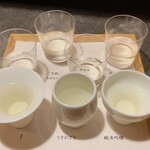



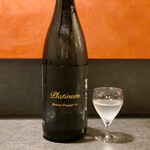

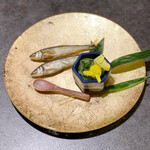





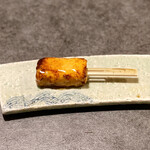
Details
Reservation Info
(on) a subscription basis
Payment Method
Cards accepted
(VISA, Master)
Electronic money is not accepted
QR code payment
(QR code payment is acceptable (PayPay)
Number of Seats
10 seats
(4 seats at counter, 2 tables)
Private Dining Rooms
None
Smoking and Non-Smoking
No smoking at the table
Parking
None
Facilities
Calm space, counter seating available
Drink
Wine available, focus on sake
Dishes
Stick to vegetable dishes, fish dishes.
Comments
(21)
drunkwhale
4.00
New Year's Day, this year the osechi (New Year's food) feels different, and it's so expensive, right? It was probably meant to support the struggling food and beverage industry during the pandemic, so if they are doing okay, we decided to skip osechi this year since we don't usually eat it anyway. But we still needed something to eat. A restaurant we had been wanting to visit posted on Instagram that they would be open from New Year's Day with a special menu. We quickly made a reservation. By the way, it was fully booked until the 4th, so there seems to be a demand for this kind of service. They have four time slots: 10:00-12:00, 12:30-14:30, 16:00-18:00, and 18:30-20:30. Amazing. We chose the 16:00 slot. They had a special New Year's atmosphere prepared. This is for four time slots? Are they serious? (in a complimentary way) Now, let's start the New Year with a beer... Oh, they have Inedit, of course we'll have that. It seems like this year is going to be a good one. The sake menu doesn't have prices listed, so it's a bit worrisome, but I'll mention later that it's a bit on the expensive side, maybe 3-4 times the usual price or even more (laughs). The special New Year sake and appetizer menu is a bit limited, but you can kind of understand the fusion concept (laughs). It's nice that they recommend a sake for each menu item. Inedit is a premium beer developed by the genius chef and sommelier team from the renowned Spanish restaurant "elBulli". It's fruity and delicious. I tried it for the first time and it's really good. We started with a toast using Mukaitenon, a sake known for bringing endless peace and prosperity. The atmosphere is great, with customers toasting each other with "Cheers! Happy New Year!" even if they are strangers. And the special New Year's sake cups are luxurious and surprising. We then had a sake called Oozara, a special junmai sake from Gunma's Makino Shuzo brewery. It has a clear umami and acidity, a solid sake flavor. For the celebratory appetizer, we had a white chicken liver paste and dried persimmon sandwiched in a senbei (rice cracker). It's a delightful flavor that makes you confident in today's victory. The cold dish was Chaburi Namako, a dish from Ishikawa where the sea cucumber is blanched in tea and topped with vinegared daikon. The texture is excellent. The warm dish was fried bachiko (sea cucumber ovaries) and soramame (fava beans) coated in finely crushed and toasted glutinous rice flour. The bachiko has a great drying process and is a rare delicacy with a mild taste. It's the perfect dish to go with sake. We then enjoyed a sake called Kaiun, a special junmai sake with a balanced richness and a refreshing finish. It's wrapped in an orange-colored celebratory sake wrapping paper, perfect for New Year's. We also had Tenbi, a special junmai sake with a gentle and refreshing aroma that pairs well with meals. For the turnip dish, we had a turnip puree made with clam broth, sprinkled with yuzu peel. It's deeply flavorful, and the turnip's umami is impressive. The clams also add a robust umami. It's truly a delightful experience. We then tried Shita Izumi, a honjozo sake with a clear taste and a good umami, perfect for Japanese cuisine. The zodiac label adds a nice touch. It's a sake that goes well with traditional Japanese dishes.




林檎パイ
4.50
A restaurant with a great atmosphere where you can enjoy specialty dishes, Manpukudo in Osaka. Can you believe it's their 20th anniversary in June 2023! 20 years is such a long time. There must have been good and tough times, but a restaurant that can last that long must have many charms that attract customers. I used to visit this beloved restaurant often, but I haven't been able to go recently, so I took this opportunity to attend their 20th-anniversary celebration event. On this day, they offered a special a la carte menu instead of the usual course menu for the anniversary. They also served Aichi Prefecture's sake "Shikishima." I've never tried Shikishima before, so I was really looking forward to it. First, they brought out the anniversary gift. It was a sake with tomato extract and green plum honey syrup. It was refreshing and delicious. Then, there was a celebratory dish with white liver pate and green plum honey simmered in. The richness of the white liver was delightful, and it paired well with the sake. The assortment of dishes that followed was delightful. It included various items like crab, cream cheese, horse mackerel sushi, simmered eggplant, thick rolled omelet, sesame-seasoned sardines, and mentaiko egg. The mentaiko egg was especially delicious. This set of appetizers was only 2000 yen. Truly a generous offering for their 20th anniversary! I ordered the "Shikishima Set" for 1500 yen, which included a tasting of seven different 30ml sake varieties. Tasting them side by side really highlighted the differences in flavor. I realized I prefer the slightly cloudy sake. Next, I ordered the recommended three dishes for 2500 yen. It included fried young corn, purple sea urchin with potato skins, and duck with eggplant. Everything was incredibly delicious, especially the duck. The duck at Manpukudo is truly delicious, with a substantial texture and excellent seasoning. It was a pleasant reminder of how great Manpukudo is. I highly recommend it to those who enjoy sake. They welcome solo diners as well, which I appreciate. I plan to visit again soon. Thank you for the wonderful meal!




ribbon914
4.10
Today I went to Imazato. There was an event where the brewery owner was invited to enjoy sake and food at the restaurant, so I made a reservation for the Tanba no Shiramine Sake Brewery event (*´∀`)♪ I arrived at the restaurant at 5 pm. The restaurant is located about a 1-minute walk from Imazato subway station, a little south of Senichimae Street. It has a traditional Japanese appearance with impressive window lattice and red curtains. The inside of the restaurant has about 4 counter seats and 2 tables. Since I was attending alone this time, I sat at the counter seat. The course meal was a mini-course for 5,500 yen. The set of six sake pairings was 2,500 yen. You could also add two additional types of sake. Everyone arrived right on time, so the event started. We began with a toast with the optional Shiramine Platinum Junmai Daiginjo sake♪(*^^)o∀*∀o(^^*)♪ We enjoyed the food and sake while listening to the brewery owner's stories. Towards the end, there was a rock-paper-scissors tournament, and I managed to win against the brewery owner to get a Sakamidouji sticker (*≧艸≦) I couldn't eat the oyster dish due to my allergy, but I enjoyed the other dishes and sake (*´∀`)♪ Thank you for the meal.
<Food>
5,500 yen including tax
◎New onion kuzudofu... A round kuzudofu with a rich sweetness of new onions. The green of the peas is spring-like.
◎Young ayu confit with shiso and cucumber sorbet... Whole young ayu that can be eaten. The slight bitterness has an adult taste. The refreshing sorbet of shiso and cucumber cleanses the aftertaste.
◎Young corn tempura... Although it doesn't look like young corn at all, it tastes like young corn. It has a mysterious taste but it's delicious.
◎Uni... Whole uni with squid and sweet shrimp cocktail. Enjoyed with soy sauce jelly. Definitely delicious (*´Д`*)
◎Clam with miso flavored with wood mint... Large clams with miso flavored with wood mint. The sweetness of the wood mint miso goes well with Vivid (red).
◎Anago sushi... Anago pressed sushi with bone senbei on the side. Goes well with dry sake (*´Д`*)
・Oyster... Due to allergies, I could only have the mashed paste of nagaimo and edamame that accompanied the oysters.
◎Finale mapo tofu... Mapo tofu, which was previously optional, is now served as the finale. As expected, the mapo tofu here is delicious!
<Drinks>
Prices include tax
・Sake set (2,500 yen)... A set of six different sakes in small portions.
Vivid (green) - Live naturally - Junmai Ginjo Unfiltered Raw Sake
Vivid (blue) - Like the blue sky - Junmai Ginjo Unfiltered Raw Sake
Vivid (red) - With passion!! - Junmai Ginjo Unfiltered Raw Sake
Kouda Special Junmai Fire-Infused Sake
Sakamidouji Yamahai Honjozo Onikaraguchi
Sakamidouji Hyoutan Karakoma
・Shiramine Platinum Junmai Daiginjo (900 yen)
・Kouda Junmai Ginjo Unfiltered Raw Sake (600 yen)




ミナミのたぬき
4.30
I went to a Japanese restaurant called Osaka Manpukudo. I started with a dish featuring cherry blossom sea bream, including cherry blossom sea bream sushi with a sakura mochi flavor, and cherry blossom sea bream shirako mixed with kyuri sauce and topped with caviar. The aroma was delightful and the flavors were delicious. Next, I tried two skewered dishes: bamboo shoot and firefly squid tempura with a sauce made of wood sorrel miso. The bamboo shoot was crushed into a dumpling-like shape, providing a unique texture. I also tried a dish with horsehair crab and white asparagus, where the horsehair crab meat and roe were rolled into a log shape using the legs. This was a rare and interesting dish to enjoy with drinks. The harmony of the meat and roe was delightful. The white asparagus was also delicious and served as a good palate cleanser. I also tried a dish of warabi mochi in white miso broth, made from chopped warabi, providing a texture similar to warabi mochi. It was incredibly delicious. The sea urchin and white shrimp were a classic combination of flavors. The smoked oysters with potato puree and sweetened edamame were also a standout dish. The smoked flavor was impressive, yet not overpowering, and the oysters remained juicy. The potato puree paired well with the oysters. The assorted appetizers were perfect for enjoying with sake. As a complimentary dish, I tried tempura made with tea leaves. The tomato dish featured tomatoes with a unique presentation. The meal ended with asparagus-wrapped meat and a clam rice dish in clam broth, similar to ochazuke. I also enjoyed a dessert of Campari jelly. Overall, I was extremely satisfied with the meal and glad to have experienced the current dining style before changes take place next month.




酒と飯がすき焼き
3.70
Today, I visited the famous restaurant Manpuku-Do in Imazato. It seems they only offer one course. I was very satisfied with the dishes that made me feel the spring. The choice of sake that matched the dishes was also wonderful. The staff were friendly and made the dining experience enjoyable. Thank you for the feast♡


花karasu
3.80
It was a kaiseki restaurant recommended by a friend that I wanted to try. It was located not far from Imazato subway station, and as soon as I passed through the red curtain, a whole new world began. The interior was sleek and black, creating a sophisticated atmosphere. We were the only customers that day, so it felt like we had the place to ourselves. The quietness at first made me a bit nervous, but as soon as we raised our glasses for a toast, I felt relaxed. The beautifully presented and colorful dishes that were served one after another made us smile naturally. The dishes were perfect for a New Year's gathering, and the tableware was also lovely. The finale was the steamed rice with Hokkigai clam, which was incredibly delicious! I ended up drinking a bit too much without realizing it. Thank you for the wonderful meal!




ミナミのたぬき
4.20
I went to Osaka Manpukudo for some New Year's dishes. They always serve dishes little by little, but this time with the added New Year's atmosphere, I was very satisfied. The sea cucumber simmered in tea was surprisingly soft yet full of flavor, and I really liked it. They also brought back the old appetizer platter as a special New Year's dish, and it was a great upgrade. This really made the sake go down smoothly... I was very satisfied.




ミナミのたぬき
4.20
At this sake and appetizer place, Osaka Manpukudo, starting with the steamed egg custard with cod milt. The sauce has a ponzu base. It may sound unusual, but you can't taste any fishy flavor in this elegant steamed dish. The texture is great, and it warms you up, making it a perfect dish for this time of year. The snow crab is served simply, but beautifully presented. Despite the small portion, you can fully enjoy the crab. Sipping on hot sake, I am completely satisfied. The mackerel sushi is as delicious as always. The freshwater clam is served as tempura and chips, with fried mullet roe on the side. It's tasty whether eaten separately or together. The grated daikon radish with ankimo on top is a delight. The marinated skipjack tuna is served with a green onion sauce. The cutlassfish is thick and chewy, with a flavorful jelly. The lily root steamed bun has a wonderful texture and flavor. The grilled sea bream is paired with mandarin orange, which is quite interesting. The grilled chicken is simple yet tasty. The sake keeps flowing until the end. After the tofu skin rice dish, we ended with a dessert. The course was perfect for enjoying sake throughout. I'm thinking of visiting during New Year's, but it seems they require reservations in advance, so I haven't been able to book yet (laughs).




ミナミのたぬき
4.20
I went to a Japanese restaurant called Manpukudo here. I started with fig and salmon roe. The slightly light flavor of the salmon roe combined with the sweetness of the figs creates a refreshing umami taste. It's a good dish to start with. Next, I tried the chestnut, sea urchin, and mukago chestnut simmered in a sweet skin, then fried. The simple mukago is good, but the sea urchin wrapped in chestnut paste and made into a small croquette is interesting. The sweetness of the chestnut enhances the flavor and saltiness of the sea urchin, creating a nice accent. The moment I opened the matsutake mushroom chawanmushi, I could enjoy the aroma of the matsutake mushroom. The chawanmushi has a rich flavor and goes well with sake. The size is just right for drinking. The mackerel sushi was served as is, without being seared. It's full of fatty goodness. The harmony with the vinegar rice enhances the umami flavor. The crab was served simply. It's juicy because it's cooked just right. The mackerel pressed with kombu is delicious and goes well with sake. The amberjack sashimi with salted egg yolk and karasumi topping is another dish that goes perfectly with sake. The fried dashi with persimmon was a unique dish. It's not oysters but persimmons! It may be a bit sweet for heavy drinkers, but it's delicious and refreshing in the middle of the course. The saury was grilled on a cedar board. It's seasoned with miso and goes well with red wine, so I had a little wine with it. It was indeed a good match. I had a few more sips with peanuts. The grilled lamb was delicious. It has a slight unique flavor, but the level of the flavor is enjoyable. I'm glad I saved some red wine. The rice and dessert were also excellent. As always, I left satisfied. They no longer have the usual sake appetizer platter, but the handcrafted dishes that come out little by little are enjoyable for drinkers. That's all for this time. I'll have to go back when they have a new course. It's a shame they're not doing the New Year's feast, but I plan to enjoy the New Year's dishes at the restaurant in January. It's really a great restaurant.




akiko1967
4.40
We went out to a Japanese restaurant with my husband. We were drawn to the summer snow crab after only having winter dishes. We opted for the 8,800 yen course, which included one drink. We sat at the counter, which was a sunken kotatsu style. We had to take off our shoes at the entrance. I had a non-alcoholic beer, while my husband started with a honey and citrus sake. He also tried a rare Spanish beer. We then moved on to local sake, aiming to try all the options on the menu. The dishes we enjoyed included junsaai and Delaware soup, edamame and karasumi tempura, conger sushi, corn and truffle soup, sea urchin with okra and nagaimo, crab with sesame sauce, water dumplings, sazae with herb butter, assorted snacks for sake, roasted duck with fig miso, rice with dried fish flakes in broth, and dessert with shiso ice cream, crispy plum, and muscat grapes. It was a delightful evening filled with delicacies like sea urchin and snow crab. My husband managed to try out 70% of the sake menu. We parked at a nearby coin parking lot for 600 yen for 12 hours.



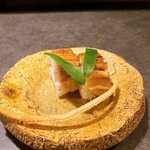
林檎パイ
4.60
Favorite store. The atmosphere is nice and they have a great selection of sake. Most importantly, you can enjoy the food and drinks at your own pace without feeling uncomfortable even if you're alone, so you can relax. The staff are kind and welcoming, even to a woman like me dining alone. On this day, I finally went with my dear friend to enjoy the food. The course is one type for 8800 yen. After toasting with beer, the Mizuki course begins~♡
↓Mizuki Course Contents↓
- Moisture Greens and Lotus Roots
- Asparagus
- Sweetfish
- Oysters
- Blue Crab
- Corn
- Various Appetizers
- Meat Dishes
- Dessert
The menu only lists the ingredients, so it's always exciting to see how each dish is prepared. Each dish has a gentle yet distinct flavor, perfect for enjoying with sake. The food here definitely pairs well with Japanese sake. Everything was delicious, but the most impressive dish of the day was the soft-shelled turtle. In a red bowl, there was broth with a round tofu ball containing soft-shelled turtle floating delicately. The taste was amazing, but the appearance was like a full moon. So beautiful♡♡ "Moon and Soft-Shelled Turtle," right? The moon is beautiful and magnificent, but the soft-shelled turtle is equally wonderful in its own way. Everyone is different and that's what makes them great!! That's what I thought when I saw this bowl. My dear friend who joined me that day seemed to enjoy the food and the atmosphere, which made me happy. I think anyone who enjoys drinking sake would love this place, but even if you're not a big drinker, the delicious food will still impress you. I was very satisfied with the sake and food. It's truly a blessing to have such a great place nearby. Thank you for the feast.




Aki7878
4.30
On this day, I had the pleasure of dining at this favorite restaurant of Mairevi-sama. It's not often that I get to eat in Imazato, so I'm looking forward to it. We sat at the counter with a sunken hearth and a table in the cozy interior. We started with a toast with beer. The course consisted of the following dishes:
- Junna: A refreshing cold dish with new lotus root. The slimy texture of the new lotus root was delightful.
- Asparagus: Thick asparagus with uni sandwiched in between. Coated with arare, it was visually appealing and had a satisfying crunch.
- Ayu bone senbei sushi: Sushi hidden beneath a senbei made of ayu bones. The warm shari and thick ayu meat were delicious.
- Soft-shelled turtle: Tofu with soft-shelled turtle mixed in, in a gentle broth. It was comforting.
- Oyster: Oysters from Senhoshiji with tomato juice jelly and sorbet. The firm texture of the oysters combined with the refreshing sorbet was excellent.
- Crab and corn: Sweet corn puree with crab. The vibrant yellow color and the flavor of corn petals enhanced the dish.
- Assorted appetizers: A colorful assortment of abalone, octopus, ground cherry, etc. The egg yolk coated in mentaiko was a standout.
- Meat dish: Duck and Kamo eggplant. The juicy duck and Kamo eggplant tempura were delicious.
- Finale: I chose the dashi tea pickles over mapo tofu. The shiny rice was a perfect ending to the meal.
- Dessert: Pineapple with sorbet. The mint added a refreshing touch.
We also enjoyed white wine and sake. Sitting at the counter, we had a pleasant chat with the owner. The whole course took about 2 hours, and it was a blissful experience! Thank you for the feast!




ribbon914
4.10
Today I went to Imazato. The February hot sake and food event was wonderful, so I was hoping they would do it again, and this time they are inviting the brewers to hold an event, so of course I signed up (*≧∀≦*) Lineup: Day 1: Yamaguchi Prefecture Hatsumomiji Day 2: Nara Prefecture Okura Honke Day 3: Hyogo Prefecture Kenbishi Shuzo Since the Hatsumomiji Harada I tried at the last hot sake event was delicious, I signed up for that day. The event is held four times a day with 90-minute sessions, with a lunch and dinner session each day. I arrived at the restaurant at 1:00 PM. This time I had the option to choose a Japanese sake course that matched the food (2,500 yen), and also had the option to add Mapo Tofu (1,000 yen). Of course, I chose the course and Mapo Tofu (*≧艸≦) The event started simultaneously. Since it had been two months since my last visit, the dishes were mostly different and each one was enjoyable (*´∀`)♪ The sake was mostly new to me as well, so I had a great time (*´ω`*) I would like to try the evening omakase course next time. Thank you for the meal.




とらねこgnocchi
4.00
The creative Japanese cuisine served at this restaurant is impressive, with each small dish carefully crafted with surprising ingredient combinations. For example, the combination of kiwi and sea bream milt offers a refreshing acidity from the kiwi that complements the richness of the milt. The honey-glazed fava beans and bottarga monaka resemble sweet red bean paste and are delicious. The white asparagus and sea urchin pairing with a gentle dashi jelly is delightful. The bracken fern-infused bracken mochi in white miso soup is unique and delicious. The stewed tomato stuffed with minced chicken and topped with warm broth is a perfect balance of acidity and umami. The hairy crab and butterbur with sesame sauce is a harmonious blend of fluffy crab and crisp butterbur. Each dish in the eight-course meal was meticulously prepared and delicious. The eel stick sushi, yolk mentaiko, and cheese soy sauce pickles are perfect for accompanying drinks. The slow-cooked lamb with cabbage and yolk vinegar is incredibly tender, with the vegetables adding a refreshing touch. The addition of crispy fat would have made it even better. We also received two complimentary dishes, and the sake pairing was excellent. Overall, all the dishes were delicious, although having sashimi in one of the courses would have been even better. The serving staff were friendly and made the dining experience enjoyable. The portion sizes are modest, making it an ideal course meal for those who enjoy pairing food with alcohol. However, I wonder how satisfying it would be for non-drinkers. Thank you for the wonderful meal.




トラフグ0605
4.40
The atmosphere is like a high-class izakaya, similar to Spirited Away. The restaurant is mainly made of wood. I will evaluate the memorable items.
First dish: The kiwi sauce has a refreshing acidity. The Thai shirako is rich without any fishy smell. The combination with the kiwi sauce was excellent, stimulating the appetite.
Second dish: A small dish similar to Monaco, with sweet edamame beans inside and sprinkled with karasumi powder. It had a dessert-like feel overall.
Third dish: Clams with a miso sauce that combines the best of Western and Japanese flavors. The clam broth was also present, making it enjoyable until the end.
Bonus: While eating clams, a small tempura of bamboo shoots and firefly squid appeared. The tempura was light and crispy, not just a typical bonus dish.
Fourth dish: Homemade warabi mochi was chewy and melted in the broth. An unusual dish, but well executed and unique.
Fifth dish: The rice itself was plain, but it could be made into ochazuke or eaten with dried baby sardines and sansho pepper. The dried baby sardines had a light flavor and a pleasant aroma, with rice crackers as an accent. Ochazuke was easy to eat and comforting.
Sixth dish: The dessert had mint, jelly, and melon. The jelly had a wine flavor and was delicious. The melon was juicy and sweet. It was a refreshing end to the meal. Overall, the restaurant was consistent with the owner's attention to detail, and I believe it is a very good restaurant without any particular flaws.




林檎パイ
4.60
My favorite restaurant near my house♡ I visited in March and here are some of the dishes I tried. Yayoi's dishes: Duck and vegetable tempura with edible flowers on top. Light and refreshing, it set high expectations for the upcoming courses! Sea urchin dish: Sea urchin and green peas in a jelly-like texture, served in clam broth. Topped with micro wasabi leaves, it had a gentle and beautiful taste. Firefly squid: Skewered firefly squid wrapped in white fish and fried. The texture was chewy and delicious. Crab dish: Crab miso mixed with crab meat. So delicious! Sayori sushi: Sayori fish sushi wrapped in cherry blossom leaves. The refreshing aroma of cherry blossom leaves complemented the taste of Sayori fish. New onion and clam: Grated new onion and clam dish with a gentle flavor. Young sweetfish: One-night dried young sweetfish with basil porridge. A surprising but delicious combination. Taro: Taro with grated black ink. The delicious black ink flavor made the sake go down smoothly. Shellfish dish: Shellfish, tomato, udo, and seaweed salad. The refreshing tomato added to the umami of the shellfish. Scallop: Scallop miso grilled and topped with raisins. The texture and smoky flavor of the scallop were irresistible. Bamboo shoot: Bamboo shoot steamed bun with seaweed sauce. The crispy exterior and chewy interior of the bamboo shoot bun were delightful. Assorted side dishes: Edible ground cherries, celery soy sauce pickles, seaweed vinegar, sesame-flavored sardines, egg omelet, salted cod roe with cheese, and Chinese wine-marinated cheese. Always a pleasure to enjoy with sake. Meat dish: Grilled beef with red algae. The beef was tender and flavorful, and the red algae was delicious. Finale: Chirimen sansho tea porridge. I could eat a bowl full of this delicious chirimen sansho. Finished with a sweet dessert, I was completely satisfied. Sake also flowed well. My favorite was the Nagano sake, Hokkoshoshojun Ginjo Nigori sake. It was dry with a slightly acidic flavor that was irresistible. Oh, I love Japanese sake. I have also visited in June and July, so I will write reviews for those visits as well. Such a wonderful restaurant. I am lucky to have a great restaurant nearby. Thank you for the delicious meal!




daisukeshi
4.00
I was brought here by a regular customer and I had always wanted to visit this restaurant. The chef is a nice person and the atmosphere of the restaurant is great. I think they only offer course meals now. They have a wide variety of Japanese sake that goes well with the food. The mapo tofu that the chef used to make when he was doing Chinese cuisine in the past is excellent. I would love to come back and eat this dish again.



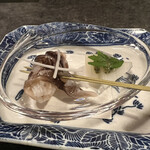
hirono.qoo
3.50
I learned for the first time from a friend that there is such a wonderful traditional Japanese restaurant in Imazato. Six of us rented out the counter and came here for a private party. There are also table seats in the back. The food was delicious, the atmosphere was great, and the cost performance was excellent. We drank a lot of sake. I want to come back again.
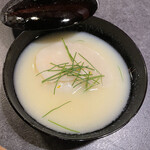



ribbon914
4.10
Today, I visited Imazato again. Even though I was here just last month, I was intrigued by the sake and food event, so this time I decided to come for lunch. I arrived at the restaurant at 13:15. It is located about a 1-minute walk from Imazato subway station, tucked away in a side street off Sennichimae Avenue. The event operates on a rotating schedule with four sessions per day. This session had five participants. I was grateful for the spacious table seating (*´ω`*) The meal was a mini-course priced at 2,500 yen excluding tax. Sake was priced at 500 yen and up, with the option to add popular lunch items like mapo tofu (1,000 yen) and dessert (500 yen). I decided to add the mapo tofu to start the course. The sake was served with warmth by the former director of the Saikouya Sake Research Institute. I let him choose all the sake for me since I rarely have warm sake. It was interesting to see how the taste changed with different temperatures and sake vessels (*´ω`*) I would love to try the seasonal omakase course, but I would also like to participate in these mini events every month (*≧∀≦*) I hope they continue next month as well (*´Д`*) Thank you for the wonderful meal.
<Food>
2,500 yen excluding tax
- Sea cucumber: Very tender and not too fishy since it's been boiled.
- Cod milt: Coated in flour and grilled, similar to takoyaki. Definitely delicious!
- Cockle: A menu item not listed. Rolled cockle and vinegared udo.
- Angler liver: Angler liver and daikon radish. The broth is delicious.
- Broad beans: Fried broad beans with sea urchin and arare.
- Assorted appetizers: Colorful fish dishes that go well with sake. Paprika nanban-zuke, dried persimmon rolls, cream cheese marinated in soy sauce, celery marinated in soy sauce, sesame mackerel, mentaiko with egg, and mackerel sushi. I enjoyed pairing different sake with the first four dishes and the last three.
- Hairtail: Grilled hairtail on cedar wood. The aroma of cedar wood is irresistible.
- Mapo tofu (1,000 yen excluding tax): Mapo tofu with a perfect balance of numbing and spicy flavors. I really like this mapo tofu.
<Drinks>
500 yen and up excluding tax
- Hanazumi Honjozo (complimentary sake)
- Harada Warm Sake: Paired with cod milt.
- Shirao Special Junmai Sake: Paired with cockle.
- Kinshu Yamahai Honjozo 15-year-old Aged Sake: Paired with angler liver.
- Kujira-nami Junmai Sake: Paired with the first four appetizers (vegetables, etc.).
- Shirao Derakara Junmai Sake: Paired with the last three appetizers (fish and mackerel sushi).
- Hatsuyukihai Kan Kan Junmai Sake: Paired with hairtail.
- Matsunomori Raku Junmai Ginjo Sake: Paired with mapo tofu.




林檎パイ
4.50
I attended a hot sake event at Manpukudo, a favorite restaurant near my home, in February with my friend who loves sake. Unlike the usual course, we were able to enjoy dishes that go well with sake at a reasonable price. The course for the hot sake event was only 2500 yen excluding tax, and hot sake was available from 500 yen. Since it was a special event, I think the price was very reasonable to enjoy the delicious dishes at Manpukudo for 2500 yen. Here are some of the dishes we enjoyed: sea cucumber served in a beautiful dish, cod milt with octopus-like seasoning, scallops with a vinegar miso sauce, my favorite cod milt, fried sea bream and fava beans, assorted appetizers that go well with sake, and saury sandwiched in cedarwood with ginkgo miso. We also ordered mapo tofu and rice for 1000 yen as a final dish. The mapo tofu went surprisingly well with the hot sake, even though I was a bit worried about the combination. We also tried three different types of sake in different sake cups, each with a unique aroma. Overall, we enjoyed various types of sake and dishes, and it was a delightful experience. I hope they will host more events like this in the future. Thank you for the wonderful meal!




yoshi800
4.30
Exactly one year ago, I visited "Manpukudo" and was truly, truly, truly satisfied. I even happened to meet a friend there by chance. I visited again at the end of the year, but due to my terrible mistake, I caused a lot of inconvenience to Manpukudo. Despite that, they provided such warm and kind service that I am truly grateful. Finally, I was able to visit again in the new year, and once again, they made me feel completely satisfied. Here are the dishes I enjoyed:
- Tororo soup: The gentle sweetness of tororo prepares the palate perfectly for the upcoming dishes.
- Fried peas and sea urchin: A hot dish with a mix of peas, creamy sea urchin, and crispy rice crackers.
- Raw octopus and yuzu: A refreshing dish from Ishikawa prefecture with soft, tender octopus and tangy yuzu.
- Hair crab and rapeseed blossoms: A delicately prepared dish that highlights the deliciousness of the crab.
- Turnip with sesame tofu and karasumi: A surprising combination of turnip, sesame tofu, and karasumi that creates a unique texture.
- Oyster chawanmushi: A creamy chawanmushi with rich and flavorful oysters that spread a taste of the sea in your mouth.
- Assorted appetizers: A variety of dishes including herring, octopus, fuki, dried persimmon, celery, young bamboo shoot simmered in soy sauce, fried smelt wrapped in kelp, and mentaiko with egg.
- Braised pork belly: Sweet and savory braised pork belly that pairs perfectly with sake.
- Beltfish marinated in kelp: Well-marinated beltfish with a rich flavor of the sea.
- Scallop salad: A salad made with scallops, a local specialty in Hokuriku, that is refreshing and delicious.
- Eel and daikon in broth: A warm and comforting dish with tender eel and daikon in a flavorful broth with wasabi.
- Duck with bamboo shoots: Juicy and flavorful duck meat that is cooked perfectly rare and melts in your mouth.
- Sardine rice and shiitake miso soup: A delicious and elegant ending to the meal with sardine rice and fragrant shiitake miso soup.
- Butterbur sprout ice cream with lily root and black beans: A dessert with crispy mochi filled with butterbur sprout ice cream that is rich yet refreshing. The lily root sweet bun has a subtle sweetness and pairs well with matcha.
I did not try the mackerel sushi, but it was said to be excellent. Despite the value for money and the impeccable hospitality, I feel sorry for only paying for one person. I will definitely visit again to enjoy the seasonal dishes.




Email Login